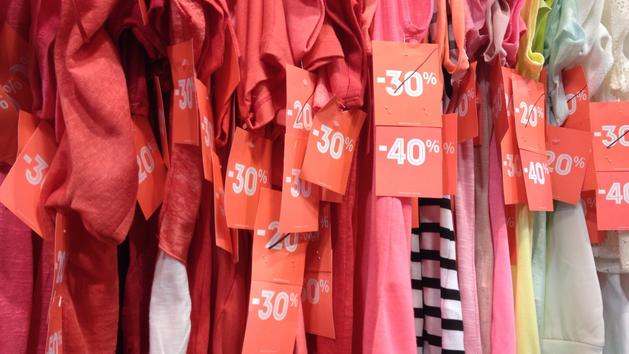The deconfinement has, in many stores authorized to reopen since Monday, a taste of urgency. You have to tame and enforce the new sanitary measures, first of all. But above all, you have to sell. For this, large brands have chosen to cut their prices: at Gifi, a “ 50% operation ” in vouchers has been launched. Similarly, Decathlon promises “ destocking ” at -50%, and Gémo adds more with promotions up to 70%.
Read also: Amazon should not reopen its warehouses in France before May 19
" Pleasure to find you ", justify the brands whose financial situation after two months of closure did not suggest such generosity. “They have a fairly strong need for cash. What matters, therefore, is not so much to make a profit as to make turnover quickly ", analyzes Daniele Pederzoli, professor of marketing at Rouen Business School. During the confinement, Gifi for example lost 200 million euros in turnover, and called on all the aid put in place by the government to keep it afloat. Now we need fresh money. " When you lose so much, the objective is really to save jobs, " explains Philippe Ginestet, boss of the firm.
Another emergency: the warehouses are overflowing. During the confinement, if the money did not come in, the stocks continued to grow. In a just-in-time distribution model, few stores had infrastructures adapted to a long paralysis of activity. Thus, the Irish firm Primark had to urgently find warehouses to store the equivalent of 1.5 billion pounds of goods.
Read also: These traders not so eager to reopen their stores
Since their reopening in France, many firms have therefore preferred not to let stocks sleep in warehouses and therefore cut prices. A fortiori when the seasonality of products - clothing, and shoes for example - is important.
Last explanation for these bargain prices: you simply have to encourage customers to come back to the stores. " Many discovered e-commerce during confinement," explains Daniele Pederzoli. For the brands, even if this is not the main reason, the fear that they will have liked it motivates all these reductions ”. At Gifi, this has paid off: attendance has " doubled compared to normal ", in stores which applied a 50% discount, according to Philippe Ginestet. And this despite the measures of hygiene and physical distance. In comparison, six Gifi franchised stores which had chosen not to apply the promotional rates saw their attendance increase by only 30%.
Department stores and small shops are scarce
This recovery at full speed, however, worries independent businesses who, they find it more difficult to keep pace. Because they do not have the same room for maneuver. " In a large brand, the multiplier between the purchase price and the sale price is from 7 to 12, because they produce at very low cost, explains Bénédicte Boudet-Corric , general delegate of the Confederation of French merchants (CDF). Even with promotions at -40%, their margin remains very large. At an independent trader, this multiplier is between 2 and 3 ” .
The collections were received in mid-March and barely had time to come out of the boxes: " either they were only sold for a few days, or they were not sold at all ", deplores Bénédicte Boudet- Corric. Sell them already? A " disaster " for many small traders. However, they fear being forced to do so. The independents " especially do promotions and private sales if their neighbors do ," continues the general delegate. If in the street there are promotions everywhere and one of the shops does not do it, it will have zero customers ”.
The Confederation of Merchants of France has thus advocated that the big brands refrain from implementing reductions, so that all take advantage of the thaw in consumption and thus sell at the usual price. Its president Francis Palombi wanted to ask the Minister of the Economy Bruno Le Maire to speak in this direction, for the moment without success. Five major brands - Boulanger, Cdiscount, Fnac Darty, La Redoute, Rue du Commerce and Showroomprivé - have also confirmed the dates of their reduction operation "The French Days", as of May 27, 2020.
A new debate on sales
Another battle, a little more distant, could on the other hand bear fruit. Major brands and independents agree on one point: it is necessary to postpone the sales, in order to allow traders to better manage their stocks and to sell, for a few weeks, at a " normal " price.
The Ministry of Economy said it was interested in the proposals of traders in this area. The sales usually start on June 24 and run until July 21 in most French departments, "but they could start rather around mid-July, " said Secretary of State Agnès Pannier-Runacher, this Wednesday.
Read also: Opening of shops: "I don't see a return to normal before September"
But for Daniele Pederzoli, what looks like a good idea could actually backfire on traders: " I'm not sure it's the best solution. Sales that were not made during containment risk being very little caught, if at all, "if prices are deemed too high," explains the marketing professor. " Especially with regard to clothes, shoes, perfume ". The Ministry of Economy has indicated that the question will be decided " in the coming days ".









